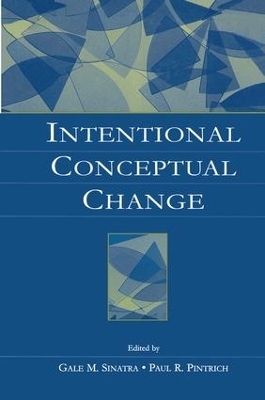
Intentional Conceptual Change
Routledge (Verlag)
978-1-138-97292-6 (ISBN)
This volume brings together a distinguished, international list of scholars to explore the role of the learner's intention in knowledge change. Traditional views of knowledge reconstruction placed the impetus for thought change outside the learner's control. The teacher, instructional methods, materials, and activities were identified as the seat of change. Recent perspectives on learning, however, suggest that the learner can play an active, indeed, intentional role in the process of knowledge restructuring. This volume explores this new, innovative view of conceptual change learning using original contributions drawn from renowned scholars in a variety of disciplines.
The volume is intended for scholars or advanced students studying knowledge acquisition and change, including educational psychology, developmental psychology, science education, cognitive science, learning science, instructional psychology, and instructional and curriculum studies.
Gale M. Sinatra, Paul R. Pintrich
Contents: Preface. G.M. Sinatra, P.R. Pintrich, The Role of Intentions in Conceptual Change Learning. Part I: Cognition, Metacognition, and Intentional Conceptual Change.M. Ferrari, N. Elik, Influences on Intentional Conceptual Change. N. deLeeuw, M.T.H. Chi, Self-Explanation: Enriching a Situation Model or Repairing a Domain Model? P. Thagard, R. Zhu, Acupuncture, Incommensurability, and Conceptual Change. M.G. Hennessey, Metacognitive Aspects of Students' Reflective Discourse: Implications for Intentional Conceptual Change Teaching and Learning. M.L. Luque, The Role of Domain-Specific Knowledge in Intentional Conceptual Change. Part II: Epistemological and Social/Motivational Factors in Intentional Conceptual Change.T. Andre, M. Windschitl, Interest, Epistemological Belief, and Intentional Conceptual Change. L. Mason, Personal Epistemologies and Intentional Conceptual Change. A.A. diSessa, A. Elby, D. Hammer, J's Epistemological Stance and Strategies. C. Hynd, Conceptual Change in Response to Persuasive Messages. S.A. Southerland, G.M. Sinatra, Learning About Biological Evolution: A Special Case of Intentional Conceptual Change. E. Linnenbrink, P.R. Pintrich, Achievement Goals and Intentional Conceptual Change. Part III: Prospects and Problems for Models of Intentional Conceptual Change.S. Vosniadou, Exploring the Relationships Between Conceptual Change and Intentional Learning. G. Hatano, K. Inagaki, When Is Conceptual Change Intended? A Cognitive-Sociocultural View. P.R. Pintrich, G.M. Sinatra, Future Directions for Theory and Research on Intentional Conceptual Change.
| Erscheinungsdatum | 20.07.2016 |
|---|---|
| Verlagsort | London |
| Sprache | englisch |
| Maße | 152 x 229 mm |
| Gewicht | 680 g |
| Themenwelt | Geisteswissenschaften ► Psychologie ► Allgemeine Psychologie |
| Geisteswissenschaften ► Psychologie ► Pädagogische Psychologie | |
| Geisteswissenschaften ► Psychologie ► Verhaltenstherapie | |
| Sozialwissenschaften ► Pädagogik | |
| ISBN-10 | 1-138-97292-4 / 1138972924 |
| ISBN-13 | 978-1-138-97292-6 / 9781138972926 |
| Zustand | Neuware |
| Haben Sie eine Frage zum Produkt? |
aus dem Bereich


